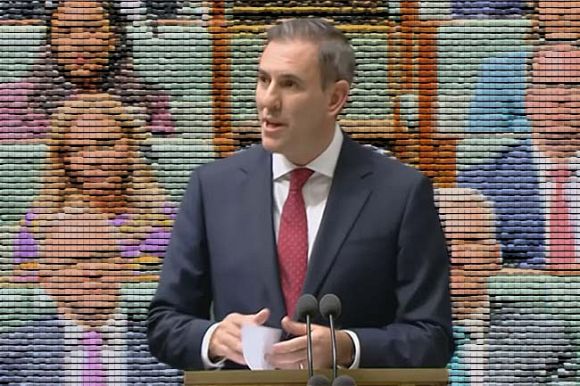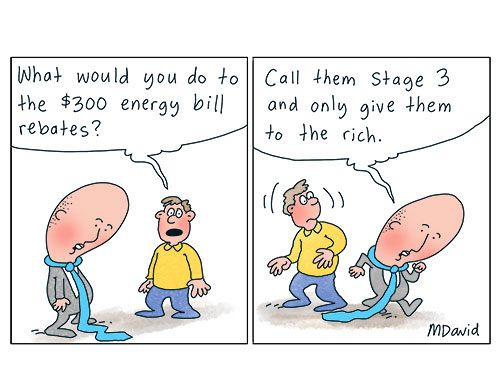Stephen Koukoulas analyses this year's Federal Budget and pronounces it a solid budget, crafted for the times.
IN HIS THIRD Budget since taking office two years ago, Treasurer Jim Chalmers did a particularly good job balancing macroeconomic necessities and the political dividend of economic management, while delivering a range of socially progressive reforms that take a solid step towards greater equality.
As is always the case with budget and economic policy more generally, in an ideal world, more could have been done. But the current fiscal and economic climate is far from ideal given the fiscal deficit and debt-ridden train wreck the Labor Government inherited from nine years of Coalition dithering, favouritism and largesse. Add to that the fact that the economy is stumbling close to recession, Chalmers’ Budget delivered in important areas.
Amending the Stage 3 income tax cuts by redirecting the balance of those tax cuts towards low and middle-income earners, paid for by reducing the tax cuts to high-income earners, was a progressive reform. The fact that from 1 July 2024, the income tax cuts are directed to those in need is a reform that will help address cost of living pressures for the bulk of the population being hardest hit — namely low-income earners.
The payment of a $300 electricity subsidy to all households will further ease cost of living pressures. Its formulation of not being means tested is sensible, given the substantial cost and complexity of implementing a means test.
Another socially progressive policy was the extension of the rental subsidy which will help with the other area of financial pressure for many households – their weekly rent burden.
From the "big picture" economic perspective, this Budget was also crafted for the times, rather than being compromised by prejudice and bias.
One important and transparent benchmark of how well a budget is judged is financial market reactions to what can be disruptive news.
While many issues influence markets, within 72 hours of the Federal 2024-25 Budget being delivered, the stock market rose to within a whisker of an all-time high; the Australian dollar rose solidly and money markets went from pricing in a high probability of an interest rate increase to pricing in two interest rate cuts.
This is a reaction that would warm the heart of any treasurer.
The Albanese Government delivered a second budget surplus for FY2023-24, an achievement not seen in almost two decades. The policy reaction to the 2007 to 2010 global financial crisis and the 2020 to 2022 COVID pandemic helped to alter the way even conservatives see budget management, with budget deficits embraced where necessary to tackle severe problems.
The two subsequent budget surpluses delivered by Labor were a near textbook illustration of budget management when the economy was "overheating" in the exit from the pandemic with surging inflation and the unemployment rate falling to a five-decade low.
It was the ideal time for a surplus and the correct policy response to help pare back the surge of inflation.
This context is important when considering criticism of the return to a Budget deficit in 2024-25. This criticism is concentrated in the views of conservative commentators who continue to view economics and economic policy from a late 20th-Century lens.
As it stands, the Budget deficit is relatively small — just $28 billion or 1% of GDP.
And, critically, the Budget is moving to a small deficit in the context of GDP growth faltering, inflation falling sharply and the unemployment rate forecast to hit 4.5%.
A Budget surplus for 2024-25 was possible, but aiming for one would have been an error. Policies that would have delivered a surplus risked further grinding the economy lower and, therefore, driving unemployment towards 5%. This, rightly, was not acceptable to the Government.
Resisting calls to drastically cut spending and hike taxes is a further "tick" for the budget position.
The good Budget news is tempered by areas that remain top of the agenda for future reform. In particular, the level of the JobSeeker Payment, the generous and distorting tax treatment of housing and superannuation and housing affordability are areas where policy could have been advanced.
That said, the history of electoral unpopularity of the bulk of these policy reforms and the proximity of the next election, which is at most just a year away, ensured these policy issues remained on the back burner.
These and other issues will remain on the reform agenda for future budgets.
For the here and now, especially given the state of the economy, this Budget took several important steps to make Australia fairer whilst maintaining a focus on the big-picture economic situation.
Budgets cannot do everything for everyone. They improve conditions for targeted groups and the macroeconomy.
The Budget just passed was a good step along the long road of reform, economic management and social fairness.
Subscribe NOW to receive editorials like this one (usually only available to subscribers) directly to your inbox and access all our articles.
Stephen Koukoulas is an IA columnist and one of Australia’s leading economic visionaries, past Chief Economist of Citibank and Senior Economic Advisor to the Prime Minister. You can follow him on Twitter/X @TheKouk.
Related Articles
- EDITORIAL: Chalmers' Budget brings big picture perspective
- Mainstream media fabricates disgraceful lies about Labor's Budget
- CARTOONS: The man with the silver spoon forks up his budget reply
- 2024 Budget strengthens Australia's digital infrastructure
- Measuring a decade of reckless Liberal Party debt
 This work is licensed under a Creative Commons Attribution-NonCommercial-NoDerivs 3.0 Australia License
This work is licensed under a Creative Commons Attribution-NonCommercial-NoDerivs 3.0 Australia License
Support independent journalism Subscribe to IA.














